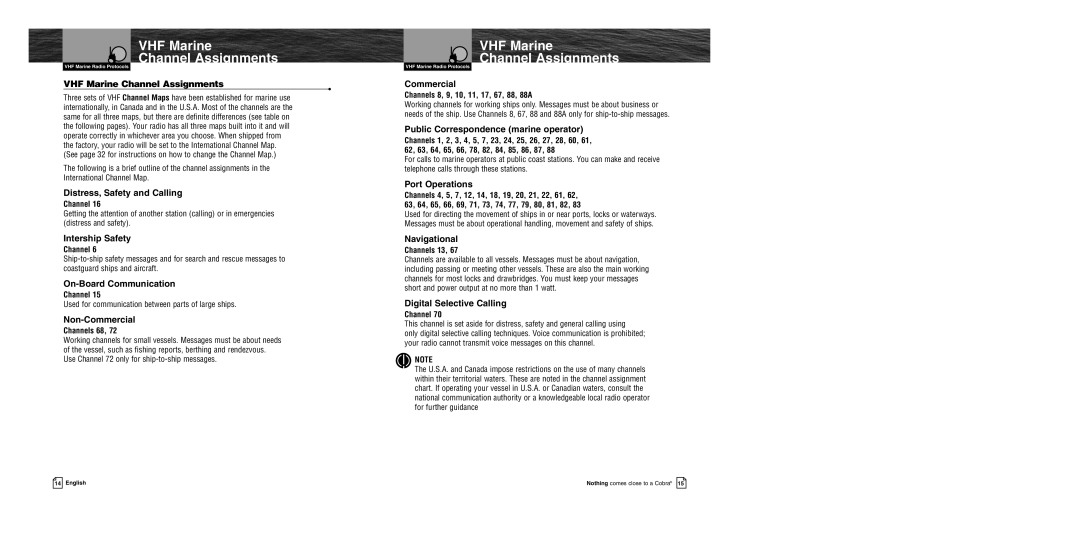
VHF Marine
Channel Assignments
VHF Marine Radio Protocols
VHF Marine Channel Assignments
•
VHF Marine Radio Protocols
Commercial
VHF Marine
Channel Assignments
Three sets of VHF Channel Maps have been established for marine use internationally, in Canada and in the U.S.A. Most of the channels are the same for all three maps, but there are definite differences (see table on the following pages). Your radio has all three maps built into it and will operate correctly in whichever area you choose. When shipped from the factory, your radio will be set to the International Channel Map. (See page 32 for instructions on how to change the Channel Map.)
The following is a brief outline of the channel assignments in the International Channel Map.
Distress, Safety and Calling
Channel 16
Getting the attention of another station (calling) or in emergencies (distress and safety).
Intership Safety
Channel 6
Channel 15
Used for communication between parts of large ships.
Non-Commercial
Channels 68, 72
Working channels for small vessels. Messages must be about needs of the vessel, such as fishing reports, berthing and rendezvous. Use Channel 72 only for
Channels 8, 9, 10, 11, 17, 67, 88, 88A
Working channels for working ships only. Messages must be about business or needs of the ship. Use Channels 8, 67, 88 and 88A only for
Public Correspondence (marine operator)
Channels 1, 2, 3, 4, 5, 7, 23, 24, 25, 26, 27, 28, 60, 61, 62, 63, 64, 65, 66, 78, 82, 84, 85, 86, 87, 88
For calls to marine operators at public coast stations. You can make and receive telephone calls through these stations.
Port Operations
Channels 4, 5, 7, 12, 14, 18, 19, 20, 21, 22, 61, 62, 63, 64, 65, 66, 69, 71, 73, 74, 77, 79, 80, 81, 82, 83
Used for directing the movement of ships in or near ports, locks or waterways. Messages must be about operational handling, movement and safety of ships.
Navigational
Channels 13, 67
Channels are available to all vessels. Messages must be about navigation, including passing or meeting other vessels. These are also the main working channels for most locks and drawbridges. You must keep your messages short and power output at no more than 1 watt.
Digital Selective Calling
Channel 70
This channel is set aside for distress, safety and general calling using
only digital selective calling techniques. Voice communication is prohibited; your radio cannot transmit voice messages on this channel.
NOTE
The U.S.A. and Canada impose restrictions on the use of many channels within their territorial waters. These are noted in the channel assignment chart. If operating your vessel in U.S.A. or Canadian waters, consult the national communication authority or a knowledgeable local radio operator for further guidance
14 English | Nothing comes close to a Cobra® 15 |
